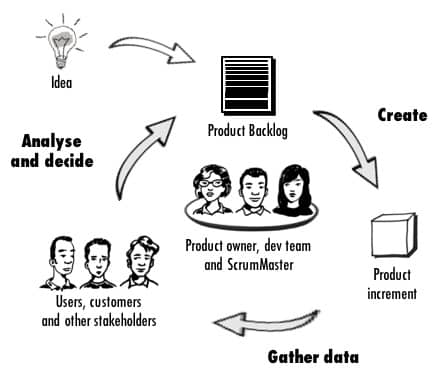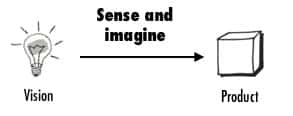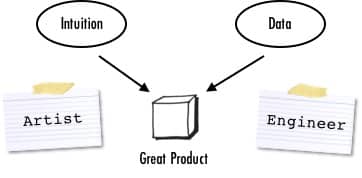Making the right product decisions is tough. Some product owners trust their intuition, others rely on data. Find out which approach is more helpful to create a successful product.
Data-driven
“But with the blast shield down, I can’t even see! How am I supposed to fight,” asks Luke Skywalker in the Star Wars movie Episode IV while training with his lightsaber on board of the Millennium Falcon. “Your eyes can deceive you. Don’t trust them. Stretch out with your feelings,” answers Ben Kenobi. This little story illustrates a fundamental question: Should we trust our intuition or our analytical abilities to make decisions?
Empirical approaches to product development such as Scrum and Lean Startup encourage us to leverage data to make decisions: We use product increments or MVPs to gather the relevant information from users, customers, and other stakeholders. Analysing the data should then allow us to draw the right conclusions and to adapt the product–to pivot or persevere. The following picture illustrates this approach:

If this blog post, for instance, does not attract as many comments and doesn’t generate as much Twitter traffic as I had hoped, does it mean that I must rewrite or remove it? The data alone is not going to tell me the right answer.
Intuition-lead
“If I had asked people what they wanted, they would have said faster horses.” This Henry Ford quote shows how difficult it can be for customers to tell us what they really need. As product owners, we have to be creative and envision the future product, a product that we believe will benefit its users and the company providing it.
Vision, however, is based on intuition or instinctive knowledge. It’s based on what we feel is right, aesthetically pleasing, and helpful. It’s the opposite of a data-driven, empirical approach:
 While using our vision to guide our decisions may seem attractive, there is a dark side: I could, for instance, follow my vision of creating what I believe would be a brilliant, amazing book only to find out after its publication that nobody really wants to read it. Time and money would be wasted, revenue lost.
While using our vision to guide our decisions may seem attractive, there is a dark side: I could, for instance, follow my vision of creating what I believe would be a brilliant, amazing book only to find out after its publication that nobody really wants to read it. Time and money would be wasted, revenue lost.
Reality Check
Let’s recap: Data alone is unlikely to tell us what to do, and trusting our intuition is risky. Human beings are prone to make errors, and our intuition can be distorted by cognitive biases. Luckily, the two approaches complement each other: As product owners, we need a vision of where we want to take our product, and we should believe that the product can benefit its users and the company providing it.
At the same time, we should be critical of our ideas, and constantly ask ourselves: “Why would anybody want to use our product? Why should the company invest in it?” We should carefully analyse the data obtained form users, customers, and other stakeholders to repeatedly test our ideas and assumptions, to check that we are on the right rack, and that it’s worthwhile to continue. This is illustrated by the following picture:

So what should I do if the data suggests that this post is not as exciting to my readers as I would have hoped? It would certainly allow me to investigate the likely causes: Is the topic not particularly relevant? Did I present it in the wrong way? But ultimately, it’s up to me to decide what I do about the post, and if I continue writing about the subject. As the product owner, I am responsible for the success of the product. No clever algorithm or analytics tool will be able to make the right decision for me.
Summary
Innovation relies on our intuition as much as on testing our ideas by gathering and analysing the relevant data. As product owners, we should neither blindly trust our intuition, nor should we expect that the data answers all our questions. Instead, we should use both, intuition and data, to guide our decisions.
You may be wondering what happened to Luke Skywalker trying to block the laser shots with his lightsaber without being able to see. He succeeded, of course, and Ben Kenobi told him: “You see? You can do it.” Interestingly, Luke employed his intuition and the data available to him, that is, the rather unpleasant experience of being hit by the laser remote. In fact, the experience helped him to improve its intuition, to anticipate and intercept the shots.
Now, would it be data-driven or intuition-lead to claim that this enabled him to become a great Jedi?

Post a Comment or Ask a Question